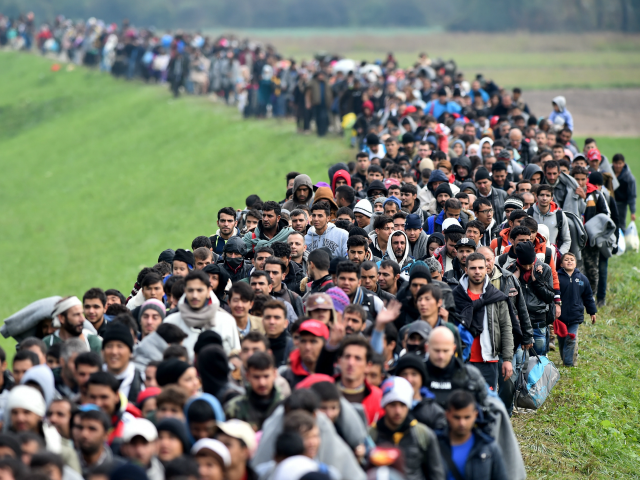A new study by British research firm Ipsos MORI conducted across 22 nations worldwide in Europe, the Americas, Africa, the Middle East, and Asia has found overwhelmingly negative opinions on migration among respondents, and a desire from many to control borders.
Published on Thursday and conducted over June and July, the study found Japan was the only country worldwide where the majority of those surveyed didn’t believe migration to their nation had increased over the past five years. Even there, almost no one believed it had actually decreased, with an equal 46 per cent of Japanese citizens interviewed believing it had increased, or had stayed the same over the period.
The attitudes of European nations are particularly marked in the study, as the continent moves through the second year of the migrant crisis engineered by pro-immigration and open border policies pursued by the European Union (EU), and nations like Germany and Sweden. A clear majority in nations like Italy, Russia, Hungary, France, and Belgium said immigration had a negative impact in their home countries.
In European nations surveyed, just 16 per cent thought immigration “generally had a positive impact” while 53 per cent said it had been negative.
One of the key arguments in favour of mass migration — that the arrival of people from diverse cultures makes “a country a more interesting place to live” — also appears to have failed to gain traction in popular thought. Not a single country polled showed a majority that agreed with the statement.
Worldwide, the nations surveyed were Argentina, Australia, Belgium, Brazil, Britain, Canada, France, Germany, Hungary, India, Italy, Japan, Mexico, Poland, Russia, Saudi Arabia, South Africa, South Korea, Spain, Sweden, Turkey, and the United States. Overall, 45 per cent of the 16,000 people interviewed globally said immigration has been negative, while just 20 per cent said the opposite, and 35 per cent said they didn’t know or it hadn’t changed things either way.
Overall, half said there were already too many migrants in their country and that they were causing changes to their homeland they didn’t like.
Compared to many countries surveyed, the United Kingdom’s attitudes to mass migration were comparatively accepting. In Britain, fractionally over half of respondents said so-called refugees were actually predominantly economic migrants — much lower than Russia where almost three quarters thought migrants were masquerading as false refugees.
Similar attitudes were also observed in Hungary, India, and Italy.
Following the idea of fake refugees is fear of terrorists gaining access to Europe by posing as those in need. Worldwide, 60 per cent said terrorists were using the migrant crisis to infiltrate other nations. Yet this trend was particularly pronounced in some countries, with the United States, Italy, Germany, Hungary, and Russia at or above 70 per cent.
Remarking on the results of his study Bobby Duffy, Managing Director of Ipsos MORI’s Social Research Institute, said: “None of the 22 countries surveyed have a majority of people saying that immigration has had a positive impact on their country – although there are a very wide range of views within this.
“The sense of pressure in countries like Turkey, Italy, Hungary and Russia is particularly clear from the survey…Looking forward to the negotiations with the EU on the terms of Britain’s departure, the survey provides a clear indication that Britons would be in favour of a points-based system to control immigrant numbers: we are the most likely out of all 22 countries included to say that skill levels should be a key criterion for allowing immigrants to come to the country.”

COMMENTS
Please let us know if you're having issues with commenting.